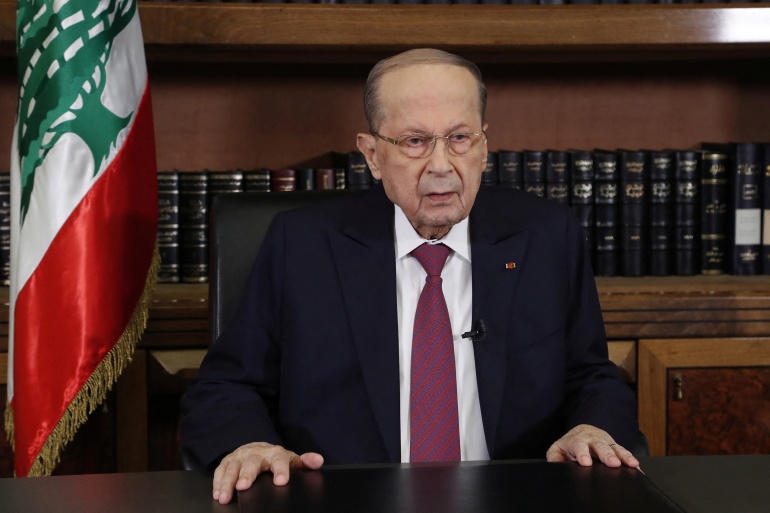
by aljazeera.com — Lebanon has warned Israel against any “aggressive action” in disputed waters where both states hope to develop offshore energy, after a ship arrived off the coast to produce gas for Israel. President Michel Aoun said any activity in the disputed area would amount to an act of aggression and a provocation, after the arrival of the natural gas storage and production ship operated by London-based Energean.
Israel says the field in question is within its exclusive economic zone, not in disputed waters. But in a statement on Sunday, the Lebanese presidency said Aoun discussed with caretaker Prime Minister Najib Mikati the vessel’s entry “into the disputed maritime area with Israel, and asked the Army Command to provide him with accurate and official data to build upon the matter”. Aoun said negotiations to delineate the southern maritime border continued and “any action or activity in the disputed area represents a provocation and an aggressive action”.
There was no immediate response from the Israeli government to Aoun’s statement. Israeli Energy Minister Karine Elharrar welcomed the vessel’s arrival and said she hoped it would be brought online quickly. “We will continue to work to diversify the energy market and maintain stability and reliability,” she said. Energean said its floating production storage and offloading vessel arrived on Sunday at the Karish field, about 80 km (50 miles) west of the city of Haifa, in Israel’s exclusive economic zone. The company said it planned to bring it online in the third quarter. Mikati said Israel was “encroaching on Lebanon’s maritime wealth, and imposing a fait accompli in a disputed area”, calling this “extremely dangerous”.
The United States began mediating indirect talks between the sides in 2000 to settle a long-running dispute between old foes that has obstructed energy exploration in the eastern Mediterranean. Lebanon is home to the heavily armed, Iran-backed Hezbollah group, which has fought numerous wars with Israel. Hezbollah has previously warned Israel against drilling for oil and gas in the disputed area until the issue is resolved, and said the group would take action if it did so.
Both Israel and Lebanon have made claims at the United Nations regarding their maritime borders. Lebanon says its border cuts into the sea at an angle farther south and Israel’s claim runs farther north, creating a triangle of disputed waters.

By lorient-lejour.com.lb — BEIRUT — Both caretaker Prime Minister Najib Mikati and President Michel Aoun on Sunday slammed Israel after one of its ships arrived at a disputed maritime gas field off the Lebanese coast. A floating production, storage and offloading unit (FPSO) from the Energean Power company arrived at part of Israel’s disputed exclusive economic zone with Lebanon on Sunday to begin exploiting the Karish gas field on behalf of the Israeli state, which provoked indignant reactions from Lebanese officials. In a statement Sunday afternoon, Aoun said that any work done by Israel in the disputed area would be considered a “provocation and hostile act.” The president also asked the commander-in-chief of the army, Joseph Aoun, to “give him all the precise official data” on this subject, in order to take the necessary measures.
For his part, Mikati said in a statement, “The Israeli enemy’s attempts to create a new crisis, by encroaching on Lebanon’s maritime wealth, and imposing a fait accompli in a disputed area in which Lebanon adheres to its rights, is extremely dangerous.” Mikati further warned that Israel’s act “could create tensions the repercussions of which no one can foresee.” He added, “We call on the UN and all parties concerned to understand the situation and compel the Israeli enemy to stop its provocations.”
The arrival of the platform in Mediterranean waters takes place while negotiations between Lebanon and Israel have been suspended for months. These strained talks, which started in 2020, were based on United Nations decree 6433/2011 claiming an area of 860 km2 delimited to the south by line 23.
But after a few rounds of discussions, Lebanese negotiators including military and civilian experts presented a maximalist claim of an additional 1,430 km2 limited by line 29, which would partially encompass the Karish field. Since then, they have urged the authorities to amend Decree 6433 at the UN, a sine qua non condition to formalize this request, without reaction from the country’s leaders.
However, Aoun also recalled having sent a letter to the United Nations “several weeks ago” which states that the Karish gas field is in the disputed area and that Beirut “is keen to respect its rights over its offshore resources.” In this missive, “Lebanon asked the Security Council to ask Israel not to drill in the controversial areas, which could constitute a threat to the security of the two countries.”
The Energean platform, built especially for the Karish field, should enable Israel to obtain its first gas deliveries by the third quarter of 2022, according to the specialized site “Offshore Energy.”
On Twitter, several of Lebanon’s new opposition MPs commented on Israel’s encroachment on the disputed area. MP Halimé Kaakour, for her part, regretted that the platform “has violated line 29 while the authorities remain silent, after they showed reluctance to sign decree 6433.”
Her colleague MP Waddah Sadek blamed Aoun for the fact that Lebanon “will enter a weak position” in any future negotiations on the maritime border “when he knew that the Israeli exploitations would soon begin,” alluding to a possible “deal with the Americans” which could have been concluded by the head of state. The so-called “change” deputies announced that they will look into this file during a press conference on Monday, among other subjects.



